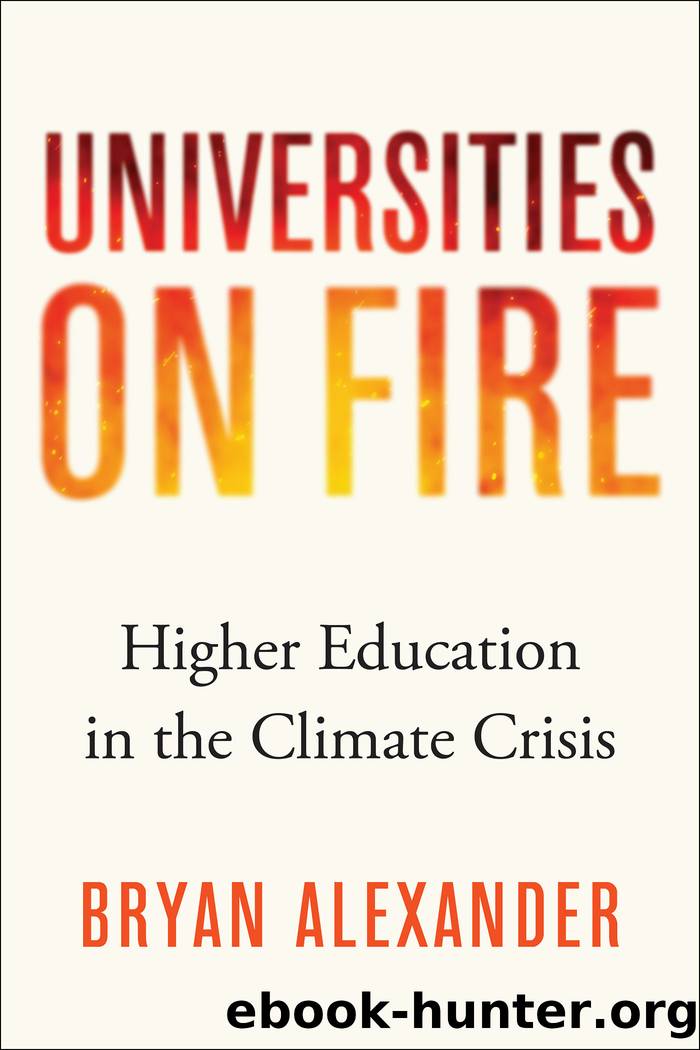Universities on Fire by Alexander Bryan;

Author:Alexander, Bryan;
Language: eng
Format: epub
Publisher: Johns Hopkins University Press
Published: 2022-06-15T00:00:00+00:00
Academics at Large in the World
We can widen our analytical aperture even further and consider how academia approaches the rest of the human race, including not only states but whole populations. After all, there is an ancient tradition of faculty taking public stances through speeches, writing, presentation, consulting, media engagements, and more. The internet has amplified the range of what Americans call âpublic intellectualsâ even further, adding many more platforms, from YouTube to blogs.
Already, professors participate in the worldâs climate crisis discussions. Some do public research that wins media and policy attention. For example, the World Weather Attribution (WWA) project, a collaboration involving European and North American universities and labs, tries to identify links between climate change and extreme weather events. Other faculty members publicly engage in pro-climate activism. We have seen this in many cases, such as Penn State Universityâs Michael Mann, who brings his academic work to bear in public policy. Andreas Malm, a faculty member at Lund University, has participated in many demonstrations and some direct action, calling for, while practicing, climate militancy. Academics also intervene in public discussions to criticize climate actions. An Oxford University inorganic chemistry professor joined the Global Warming Policy Foundation, a very public climate crisis denial group. Several students have already joined climate lawsuits.37
We know from the historical record that academia can play some roles on the world stage, beyond the town-gown relationship. College and university research enters national and global discourse to some degree on its own. Beyond that, some academics have already played more active roles on the topic of climate change. Faculty have acted in the public intellectual capacity. One example saw Queensland University of Technologyâs Amanda Gearing actively documenting horrendous bush fires and sharing that knowledge, mediated through her academic abilities, with a world audience through The Conversation website and other venues. We have also seen academic faculty intervening in public discourse and decision-making, from scientists testifying before national legislatures to researchers publicly and collectively urging action on methane emissions. In chapter 2, we noted H. Tuba Ãzkan-Hallerâs recommendation that the academic tenure review process should recognize and support such interventions in the public sphere.38
Might academia play a larger role in the Anthropocene than it has done so far? In 2020, five British professors called on fellow scientists to agree to shared action and attitudes toward the climate crisis:
We pledge to act in whatever ways we are able, in our lives and work, to prevent catastrophic climate disruption. To translate this pledge into a force for real change, we will:
⢠Explain honestly, clearly and without compromise, what scientific evidence tells us about the seriousness of the climate emergency.
⢠Not second guess what might seem politically or economically pragmatic when describing the scale and timeframe of action needed to deliver the 1.5C and 2C commitments, specified in the Paris climate agreement. And to speak out about what is not compatible with the commitments, or is likely to undermine them.
⢠To the best of our abilities, and mindful of the
Download
This site does not store any files on its server. We only index and link to content provided by other sites. Please contact the content providers to delete copyright contents if any and email us, we'll remove relevant links or contents immediately.
Kathy Andrews Collection by Kathy Andrews(10573)
The remains of the day by Kazuo Ishiguro(7588)
Spare by Prince Harry The Duke of Sussex(4236)
Paper Towns by Green John(4183)
The Body: A Guide for Occupants by Bill Bryson(3843)
Be in a Treehouse by Pete Nelson(3242)
Harry Potter and the Goblet Of Fire by J.K. Rowling(3107)
Goodbye Paradise(2989)
Never by Ken Follett(2922)
Into Thin Air by Jon Krakauer(2718)
The Remains of the Day by Kazuo Ishiguro(2632)
The Genius of Japanese Carpentry by Azby Brown(2621)
The Cellar by Natasha Preston(2611)
Drawing Shortcuts: Developing Quick Drawing Skills Using Today's Technology by Leggitt Jim(2539)
120 Days of Sodom by Marquis de Sade(2451)
Architecture 101 by Nicole Bridge(2359)
Machine Learning at Scale with H2O by Gregory Keys | David Whiting(2333)
The Man Who Died Twice by Richard Osman(2317)
Industrial Automation from Scratch: A hands-on guide to using sensors, actuators, PLCs, HMIs, and SCADA to automate industrial processes by Olushola Akande(2196)
